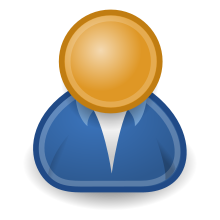User (computing)
This article needs additional citations for verification. (November 2010) |

A user is a person who uses a computer or network service. A user often has a user account and is identified by a username (also user name). Other terms for username include login name, screen name (also screenname), nickname (also nick), or handle, which is derived from the identical Citizen's Band radio term.
Users generally use a system without the technical expertise required to understand it fully,[1] while power users use advanced features of programs.
In projects in which the actor of the system is another system or a software agent, it is quite possible that there is no end-user for the system.
End user
The term end user refers to the ultimate operator of a piece of software, but it is also a concept in software engineering, referring to an abstraction of that group of end users of computers (i.e. the expected user or target-user). The term is used to distinguish those who only operate the software from the developer of the system, who knows a programming language and uses it to create new functions for end users.
This abstraction is primarily useful in designing the user interface, and refers to a relevant subset of characteristics that most expected users would have in common. In user-centered design, several fictional Personas are created to represent the archetypal end users, which may include differences concerning which computer interfaces with which each persona is comfortable (due to experience or their inherent simplicity), and the persona's technical expertise and degree of knowledge in specific fields or disciplines.
When few constraints are imposed on the end-user category, especially when designing programs for use by the general public, it is common practice to expect minimal technical expertise or previous training in end users.[2] In this context, easy-to-learn GUIs (possibly with a touchscreen) are usually preferred to more sophisticated command line interfaces for the sake of usability.
The end-user development discipline blurs the typical distinction between users and developers. It designates activities or techniques in which people who are not professional developers create automated behavior and complex data objects without significant knowledge of a programming language.
A user's account allows a user to authenticate to system services and be granted authorization to access them; however, authentication does not imply authorization. To log into an account, a user is typically required to authenticate oneself with a password or other credentials for the purposes of accounting, security, logging, and resource management.
Once the user has logged on, the operating system will often use an identifier such as an integer to refer to them, rather than their username, through a process known as identity correlation. In Unix systems, the username is correlated with a user identifier or user id.
Computer systems are divided into two groups based on what kind of users they have:
- Single-user systems do not have a concept of several user accounts.
- Multi-user systems have such a concept, and require users to identify themselves before using the system.
Each user account on a multi-user system typically has a home directory, in which to store files pertaining exclusively to that user's activities, which is protected from access by other users (though a system administrator may have access). User accounts often contain a public user profile, which contains basic information provided by the account's owner.
While most user accounts are intended to be used by only a single person, many systems have a special account intended to allow anyone to use the system, such as the username "anonymous" for anonymous FTP and the username "guest" for a guest account.
In some online communities, usernames are used as nicknames for the account holders. In some cases, a user may be better known by their username than their real name, such as CmdrTaco (Rob Malda), founder of the website Slashdot.
Terminology
Some usability professionals have expressed their dislike of the term "user", proposing it to be changed.[3] Don Norman stated that "One of the horrible words we use is "users". I am on a crusade to get rid of the word "users". I would prefer to call them "people"."[4]
See also
- Anonymous post
- End-user computing, systems in which non-programmers can create working applications.
- End-user database, a collection of data developed by individual end-users.
- End-user development, a technique that allows people who are not professional developers to perform programming tasks, i.e. to create or modify software.
- End-User License Agreement (EULA), a contract between a supplier of software and its purchaser, granting the right to use it.
- User error
- User agent
- User experience
- User space
References
This article is based on material taken from the Free On-line Dictionary of Computing prior to 1 November 2008 and incorporated under the "relicensing" terms of the GFDL, version 1.3 or later.
- ^ Jargon File entry for "User". Retrieved November 7, 2010.
- ^ "What is end user?". Retrieved November 7, 2010.
- ^ Don Norman. "Words Matter. Talk About People: Not Customers, Not Consumers, Not Users".
- ^ "Don Norman at UX Week 2008 © Adaptive Path". Retrieved 8 November 2010.
